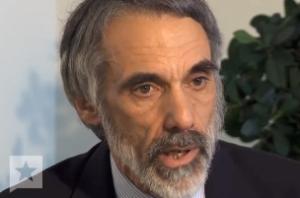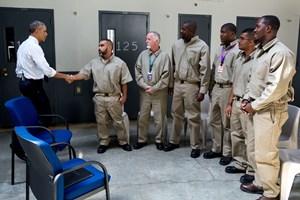This article was produced in collaboration with AlterNet and first appeared here.
For nearly half a century, America has been in the grip of incarceration fever. Beginning with the "law and order" campaigns of Richard Nixon, reprised by Ronald Reagan's "war on drugs," and seemingly carried on by inertia through the Bush-Clinton-Bush era, the fever only began to break in the last few years.

Much of the progress has come under the Obama administration, but now, there's a new sheriff in town, and he doesn't seem remotely as reform-friendly as Obama. What's going to happen with sentencing reform and criminal justice under Trump and the Republicans?
To try to find some answers, we turned to someone who's been fighting for reform for decades now, Marc Mauer, executive director of the Sentencing Project, a Washington, DC-based nonprofit committed to working for a fair and effective criminal justice system by promoting reforms in sentencing policy, addressing unjust racial disparities and practices, and advocating for alternatives to incarceration.
Drug War Chronicle: When it comes to sentencing reform, we're likely in for a rough ride these next few years with tough-talking Trump in the White House and Republicans in control of both houses of Congress. But before we look forward to what may come, it's worth looking back at where we've been and what's been accomplished in the last eight years. How did sentencing reform do under Obama?
Marc Mauer: I think we saw very substantial reform, both in terms of actual policy changes that have made a real difference, but also in terms of a change in the political environment, which is really critical for long-term reform.
We saw substantial changes coming out of Congress, the White House, and the US Sentencing Commission. In Congress, probably the most substantial piece of legislation was the Fairness in Sentencing Act of 2010, which reduced -- but didn't eliminate -- the crack vs. powder cocaine sentencing disparity.
But changes put in place by the Sentencing Commission have had the largest impact. It amended the sentencing guidelines to reduce punishments for drug offenders, which affected an estimated 46,000 people currently serving federal drug sentences. Of those, about 43,000 have seen their cases reviewed, with 29,000 getting sentence reductions and 14,000 getting denied. These are going to be rolling reductions -- for people who might have had three years left, the guidelines change might knock that down to six months; for people doing 30 years, it might knock it down to 27. They still have a long way to go, but not as far as before. This is having and will have the most significant effect.
The Obama White House was very active on sentencing reform, too. Obama commuted more than 1,700 federal prison sentences, a third of those life sentences, typically for third-time drug offenses, and that has a very significant effect. They've also done a number of initiatives around re-entry, collateral consequences, "ban the box" policies, and the like.
The Equal Employment Opportunity Commission recently issued guidance to employers about when it is and isn't appropriate to use prior criminal records when considering employment applications. The administration set up an interagency reentry council that brought together a number of cabinet agencies to see what they could do to have an impact on easing reentry.
There's been a congressional ban on inmates using Pell grant education funds, which only Congress can overturn, but the Obama administration created a pilot Pell grant program and was able to restore some funding on a research basis. The estimate is that about 12,000 incarcerated students will be able to take advantage of that.

MM: I'm not overly optimistic. He's been supportive of some criminal justice reform in the past, most notably the Fair Sentencing Act and the Prison Rape Elimination Act -- that involved a left-right coalition that felt prison rape was a bad thing, and provided money for research, training, and oversight as ways to reduce prison rape and sexual assault.
But in other areas, he's pretty much a hardliner. He was one of a handful of Republicans who vocally opposed sentencing reform legislation that was moving through Congress last year. He's one of the reasons the bill never got a Senate floor vote, even though it had passed out of the Judiciary Committee.
He's expressed skepticism about the work of the Civil Rights Division at Justice, particularly toward the consent decrees that it has imposed on cities and police departments making them agree to try to deal with tensions police law enforcement and African-American communities. That wasn't a pro- or anti-law enforcement approach; we have a real problem, and we need to get the parties working together. Getting law enforcement and local officials to agree that we have a problem is a very important tool to address a very serious problem.
To just say as Sessions does that he supports law enforcement doesn't get us very far. What do we do when law enforcement isn't doing the right thing, when it's violating people's rights? This will be very problematic.
And he continues to express support for harsh sentencing. It will be very interesting to see what perspective he has on what federal prosecutors should do. Eric Holder directed US Attorneys to change their charging practices in low-level drug cases so that people with minimal criminal histories wouldn't be hit with mandatory minimum sentences when possible. We haven't heard from Sessions whether he will keep that in place, or overturn it, or come up with something else. That will be critical. Attorneys general have swung back and forth on this.
DWC: That sentencing reform bill died last year, in part because of election year politics. Now the campaigns are over, but the Republicans control Congress. What are the prospects for anything good happening there now?
MM: There is some hope for sentencing reform. Among the Republican leadership, both Sen. Chuck Grassley, head of the Senate Judiciary Committee, and House Speaker Paul Ryan have publicly expressed a desire to see criminal justice reform go through this Congress. It's not entirely clear what that would look like -- would it look like last year's bill or only contain some aspects? -- but it is encouraging that they're voicing support for moving in that direction. Clearly, the big question is how the White House responds.
DWC: That is the big question. So, what about Trump? What do you foresee?
MM: Well, during the campaign, Trump called himself the law and order candidate, and he's been a vocal proponent of the death penalty and other tough measures, so that isn't encouraging. And if Sessions becomes attorney general, he would be involved, too, and that doesn't bode well for sentencing reform. Whether he makes this a priority issue or lets his GOP colleagues on Capitol Hill take the lead will tell us a lot about the prospects.
DWC: With Trump and a Republican Congress you're facing a different political constellation than you were last year. How does that change your work, or does it?
MM: It doesn't change much in the day-to-day work. To make criminal justice reform work, we've always needed to make it bipartisan. It's been too sensitive and too emotional for so long that it's just not going to work unless it's bipartisan. That worked with crack sentencing and some other sentencing reform measures moving through Congress, and we are just going to continue the work. We meet regularly with congressional offices.
When it comes to justice reform issues, the political environment has shifted from the days of just "lock 'em up." There is growing and substantial support for reform from the right, not uniformly, but there is enough commonality of purpose that there is a good base for some kind of legislative change. That doesn't mean it's going to be easy, though.
DWC: Our conversation has focused so far on the federal level, but it's the states -- not the feds -- who hold the vast majority of prison inmates. How are things looking at the state level, and what impact do you thing the new order in Washington will have at the statehouse?

And this wasn't just a blue state phenomenon. The state with the most substantial prison reduction was New Jersey with 31% -- under Christ Christie, who was generally supportive. Other states that saw big reductions were California, Connecticut, Rhode Island, and New York, but also Mississippi. We've also seen reforms enacted in places like Georgia and South Carolina, and Republican governors have been supportive.
It's quite likely the momentum we see at the state level will continue to a significant extent. At that level, policymakers are closer to the issue, and money issues are more relevant -- states actually have to balance their budgets. And by now, a number of states have had good experiences with reducing prison populations, with no adverse effects on public safety. The public has been supportive, or at least not opposed.
DWC: So, where do we go from here?
MM: Our goals and our strategy largely remain the same. We have to speak to broad audiences and work both sides of the aisle. Most importantly, we have to remember that criminal justice reform has never been easy. For several decades, we spent a good part of our careers trying to explain why tough on crime policies are counterproductive. It's been a long battle, but it's come to the point where the public environment has been shifting in a more rational, compassionate direction.
We have to build on the hard work that's been done. Now, we have Black Lives Matter and related grassroots activity, which has really spread quite quickly, creating a broader demand for change from the ground up. Some political leaders lead, but many follow; the more active support there is around the country, the more politicians have to respond.
Still, going backwards is quite possible. What happens to the commitment to civil rights? What happens to sentencing policy? If not actual backward movement, probably at least a halt to work around reentry programming in prisons and the like. That would be a real shame. We have made significant progress, the field has a much greater store of knowledge about what works and what doesn't. We are ready to try to expand on that; it would be extremely foolish in terms of public safety not to take advantage of that.
This work by StoptheDrugWar.org is licensed under Creative Commons Attribution-ShareAlike 4.0 International
Add new comment